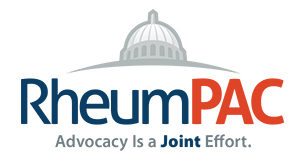 What is RheumPAC?
What is RheumPAC?
RheumPAC is the ACR’s nonpartisan political action committee (PAC) that works to elect and support pro-rheumatology candidates. It is the only PAC dedicated to the interests of the rheumatology profession. RheumPAC was created 10 years ago with the mission of educating, electing, and supporting federal lawmakers who understand and can support the issues that impact rheumatology care providers and their patients.
Why does the ACR need RheumPAC?
Under federal law, ACR/ARHP is prohibited from using its general treasury funds to make contributions in connection with federal elections. However, ACR/ARHP is permitted to form a PAC to provide its members with the opportunity to legally and ethically participate in federal election activities collectively. RheumPAC creates opportunities to educate and develop relationships with members of Congress as well as support champions for our policy priorities. RheumPAC is the financial vehicle through which ACR/ ARHP members develop relationships with and educate members of Congress and candidates who steer health care policy.
Not into politics? You already are.
Legislators make policy decisions every day that directly impact our profession, our livelihoods and our ability to care for our patients. The question is whether or not the ACR/ARHP is at the table for the discussions.
Who receives RheumPAC funds?
ACR/ARHP members and advocacy staff recommend candidates for support to the RheumPAC Committee. ACR/ARHP advocacy staff consider many factors (e.g., voting record, committee assignments, leadership, number of members in district, etc.) and make funding recommendations. The RheumPAC Committee reviews these recommendations and approves a list of supported candidates. RheumPAC is nonpartisan and considers candidates based on their past support for ACR/ARHP, record on policies that directly impact rheumatology, or their position to further our goals in Congress.
Who can contribute to RheumPAC?
U.S. citizens or permanent resident aliens who are members of the ACR or the ARHP may invest in RheumPAC.
Who is on the advocacy team?
Did you know there are four registered lobbyists on staff with the ACR/ARHP?
Adam Cooper, MS, Senior Director, Government Affairs, oversees all ACR/ARHP advocacy efforts at both the state and federal levels, including federal legislative and regulatory issues. He translates the positions of our membership as determined by the Government Affairs Committee into policy priorities and positions at every level of government. He earned his bachelor of arts from Presbyterian College, and his Master’s degree from Emory University.
Kayla Amodeo, PhD, Director, Regulatory Affairs, is based in Washington, D.C., and spearheads all ACR/ARHP issues related to federal regulation. She is our liaison to CMS, HHS, FDA, HRSA, and all bodies charged with developing rules and regulations for the implementation of healthcare legislation. She earned her bachelor of science from East Carolina University, and her PhD from the University of Alabama.
Lennie Shewmaker, JD, Senior Manager, Federal Affairs, works in Washington, D.C. as our advocate to the U.S. Congress. She maintains relationships with members of Congress and their staff and educates relevant offices on ACR/ARHP policy priorities. She also manages RheumPAC and represents the ACR/ARHP membership at political events and fundraisers in Washington. She earned her bachelor of arts from Birmingham Southern College, and her JD from the University of Georgia, and is a member of the State Bar of Georgia.
Joseph Cantrell, JD, Senior Manager, State Affairs, coordinates policy efforts in all 50 states and Puerto Rico and travels the country representing and educating the ACR/ARHP membership. He builds and maintains coalitions and manages our policy efforts in individual states where legislation relevant to rheumatology is under consideration. He earned his bachelor of arts from the University of Alabama, and his JD from Georgia State University.
